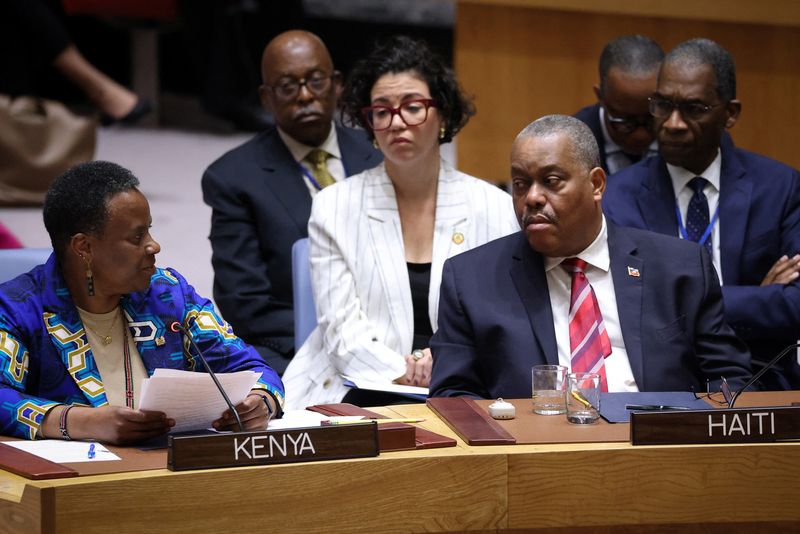[ad_1]
By Sarah Morland and Michelle Nichols
UNITED NATIONS (Reuters) -Haitian Prime Minister Garry Conille told the U.N. Security Council on Wednesday that the arrival of the first Kenyan police officers under a U.N.-backed mission marked a critical stage to restoring security in a country ravaged by gang violence.

„The arrival of the first contingent of the Multinational Security Support kicks off a new era in Haiti,” Conille told diplomats in New York.
„Haiti is currently at a critical point with 12,000 armed individuals holding a population of 12 million hostage.”
Some 200 Kenyan police arrived in Haiti last week as part of the long-delayed mission mandated to help national police fight armed gangs that have taken over most of Haiti’s capital, Port-au-Prince – fueling a humanitarian crisis that has driven nearly 600,000 from their homes and 5 million into severe food insecurity.
The full force is set to number over 2,500, but it remains unclear when these could arrive, while funding has lagged far behind requirements.
Haiti’s outgunned and under-resourced police, meanwhile, counted just over 12,000 officers at the end of May – down 1,000 since the start of the year – according to a report by the U.N. Integrated Mission in Haiti (BINUH).
Neighboring Dominican Republic’s Foreign Minister Roberto Alvarez in the meeting made „an urgent appeal to all countries that have committed funding to the MSS to fulfill their pledges and to deposit those funds as soon as possible,” referring to the Multinational Security Support by its acronym.
Without substantial additional funding, BINUH said, the mission will be unable to complete a 12-month deployment, whose initial mandate ends in October.
BINUH also warned that more clashes between police and gangs meant that more civilians, including very young children, were being killed by stray bullets and it had reports of police summarily killing passers-by.
Gangs are also recruiting and arming more children in preparation for the MSS deployment, it said, warning it was difficult to identify the ages of those killed or injured in clashes.
Conille said reforming the national police, whose chief he replaced shortly after coming to power last month, was „indispensable” for restoring public trust.
Kenya’s U.N. deputy envoy Njambi Kinyungu said the first contingent had been warmly received and was beginning joint operations with Haitian police.
Diplomats from China and Russia also emphasized stemming the flow of firearms to gangs. Most illegal guns seized in Haiti, and across the wider Caribbean, have been traced back to the United States.
Russia’s U.N. Ambassador Vassily Nebenzia said the U.N. should strengthen its sanctions regime by targeting traffickers, who unlike the five local gang leaders already sanctioned, are more vulnerable to foreign asset freezes and travel bans.

„We do not see the current embargo doing anything to prevent the flow of arms from the U.S.,” Nebenzia said. „The committee experts are clearly not eager to get into a disagreement with Washington.”
Speaking before Nebenzia, the United States’ U.N. ambassador, Linda Thomas-Greenfield, said the government was „actively working” to enforce the arms embargo, citing recent prosecutions, a new e-tracing agreement and rules to reduce gun sales without background checks.
[ad_2]
Source link

